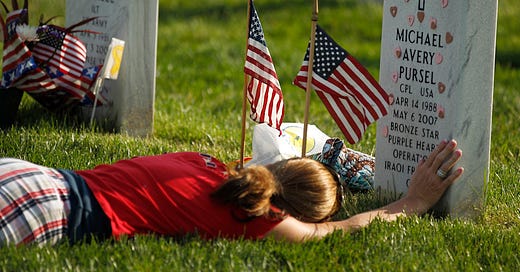Ten years into my Army career I decided to become a chaplain. I loved serving in the line units with the guys, but I saw early on the need for chaplains who "got it."
I was taught by many good chaplains, and I won't forget when one of them at the Army’s chaplain school told me, "A foundation of our ministry is helping the widows."
One day they brought in several Gold Star families: parents of dead soldiers, wives of dead soldiers, children of dead soldiers. The objective was for these families to give advice on how to minister to future families like theirs. And, more importantly, how not to minister to them.
I will never forget that day. It was my first time being around so many Gold Star patriots at once, and we were in awe of them. The pure anguish on the countenance of the mothers, the 'brave face' being put on by the widows, the shyness of the kids. There were about a hundred trainees in the room; all of us were as silent as a crypt listening to them.
Towards the end of our day together, one young widow could not hold her tears any longer and said, through shaking sobs, "I just miss him so much."
Simple and raw. It was obvious she’d been married to a warrior and a good man. All you needed for proof of this was her anguish, still fresh several years after she lost him.
I had a lot of thoughts that night. I wondered about the career ahead and how wrenching it was going to be doing this kind of ministry. I thought about how grateful I was to know such people. I recognized how profound the need was to care for the widow and the orphan, as the God of the Bible so adamantly demands. I wondered if I had one tenth the courage of that broken young woman who had to raise their kids alone.
Years later I gained another perspective. I wanted to live a life of such faithfulness, and such love, that my own widow would grieve deeply for me.
Any marriage suddenly ended by the death of a spouse is traumatic for the one left behind. That's not difficult to grasp. Yet I have seen over and over again the difference between a bad man's family grieving him and a good man's family grieving him.
How sure are we that we’re living a life worthy of a good and faithful servant of the Lord, whose widow would utter "I just miss him" over and over again?
We don't like pondering death or anything weighty for too long. We want happy times and happy faces. Sweep it under the rug. Earn another buck. Take another trip. Keep serious thoughts away and distract yourself.
Ecclesiastes 7:2 rebukes this, encouraging us to think about our death often, and to make sure our obituary is not full of regrets:
“It is better to go to a house of mourning than to go to a house of feasting, for death is the destiny of every man; the living should take this to heart.”
Last week’s post was about challenging the older generation to stop wasting their remaining years and get back in the fight.
This week our challenge is to think about how much our wives would miss us if we died today.
Here's the checklist:
-Would she remember how often you read Scripture? How often you mention it?
-Would she remember you praying over her and your children?
-Would she have a list of character traits about you to describe to her sons for them to emulate?
-Would she be proud to carry your name the rest of her life?
-Will she be able to point back to her own marriage when she is counseling a younger bride?
-Would she shake with emotion as she describes how much she misses you?
If you spend time asking yourself what you would do if you had infinite money, but never spend time wondering what your funeral would feel like, it might be time to take a knee and do some soul-searching.
Periodically evaluate your surroundings and see if your wife, children, parents, co-workers, friends, church brothers and church sisters would miss you. Really miss you. If dramatic changes are necessary, get busy. Several times in my own life I had to be rebuked, hard, or else the grieving at my own funeral would have been confined to a handful of folks.
But dramatic changes might not be necessary. Instead, start doing the slow, steady, progressive work of building your obituary. I would even suggest writing one. Yep, writing an actual obituary of yourself, and be sharply honest as you do it. No need to share it with anyone; if you keep it private you can tell yourself the truth more easily. I suspect that you, like the rest of us, know where you need to tighten up your shot group in life.
Try it this weekend. Write up a one page obituary of yourself. Give credit to yourself where it's due, and be truthful about your shortcomings. Ask your wife to read it, and (this will be tough) ask her if she agrees with it. Then ask her for her thoughts on what she would grieve about you if you died today. It’ll give you a lot to think about—if you’re humble and willing to listen.
At the ends of their lives, the Bible's greatest warriors usually had this epitath: "The servant of the Lord." That's the best we can do and is our highest possible achievement.
But close behind would be something like this quote from Caleb in "Shadow of the Mountain," a book I wrote when I was serving in the Army Chaplain Corps and had these matters heavily on my mind:
May it be written that my woman loved me, my children admired me, and the Enemy feared me.
Praise and Arrows.




